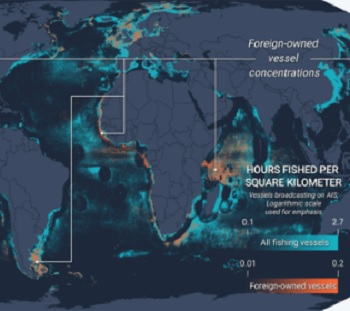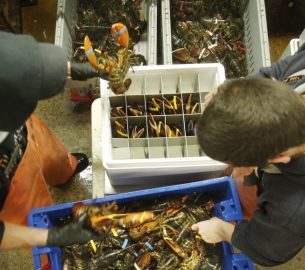Tag Archives: Asia

New research reveals shifting identities of global fishing fleet to help bolster fisheries management
A new study published today in Science Advances combines a decade’s worth of satellite vessel tracking data with identification information from more than 40 public registries to determine where and when vessels responsible for most of the world’s industrial fishing change their country of registration, a practice known as “reflagging”, and identify hotspots of potential unauthorized fishing and activity of foreign-owned vessels. The study, “Tracking Elusive and Shifting Identities of the Global Fishing Fleet” found that close to 20 percent of high seas fishing is carried out by vessels that are either internationally unregulated or not publicly authorized, with large concentrations of these ships operating in the Southwest Atlantic Ocean and the western Indian Ocean. >click to read< 18:28

Water content deductions keeping harvesters sitting out the summers sea cucumber fishery
Sea cucumbers represent a $10-million industry in Newfoundland and Labrador, according to Fish Food & Allied Workers president Keith Sullivan. The creatures are a delicacy in Asian countries and other markets, and fetch a price of 70 cents per pound, according to the province’s fishery pricing panel. When catches are landed, processors drain the water inside sea cucumbers to remove the weight of the sea water from the buying price.  Harvesters used to deduct 23 per cent of the sea cucumber’s weight across the board to account for the water, but that percentage has been changed in the past year, and Sullivan says the harvesters’ bottom lines are being impacted. “Whereas other years you might be getting paid for 80 per cent or close to that of the animal, this year in a couple of cases we’re talking just over 50 per cent,” >click to read< 11:43
Harvesters used to deduct 23 per cent of the sea cucumber’s weight across the board to account for the water, but that percentage has been changed in the past year, and Sullivan says the harvesters’ bottom lines are being impacted. “Whereas other years you might be getting paid for 80 per cent or close to that of the animal, this year in a couple of cases we’re talking just over 50 per cent,” >click to read< 11:43
Shadow markets mask the size of China’s demand for lobster
 The Chinese appetite for North American lobster is well known and getting bigger every year, but it may be twice as big as previously believed. That’s because there is a lot more lobster ending up on Chinese dinner plates than what Canada and the U.S. send over. Researchers think there is even more North American lobster being traded along indirect and sometimes shadowy routes through other places in Asia, like Hong Kong and Vietnam, that eventually ends up as luxury eats for China’s growing middle class. click here to read the story 09:54
The Chinese appetite for North American lobster is well known and getting bigger every year, but it may be twice as big as previously believed. That’s because there is a lot more lobster ending up on Chinese dinner plates than what Canada and the U.S. send over. Researchers think there is even more North American lobster being traded along indirect and sometimes shadowy routes through other places in Asia, like Hong Kong and Vietnam, that eventually ends up as luxury eats for China’s growing middle class. click here to read the story 09:54















































